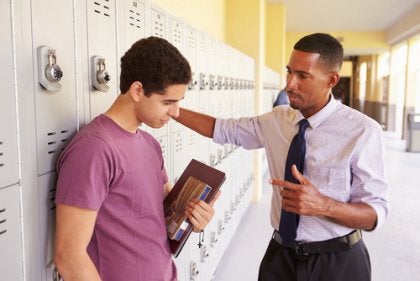What Does a School Counselor Do?

School counselors are vital for student success. That’s why they work in nearly every school. However, most of the time people have no idea what school counselors actually do.
Maybe when you were in school, you never saw your school’s counselor. You probably knew very little or nothing about the work that they did. Unfortunately, this is still true in many schools. The counselor is often underappreciated, sometimes practically invisible. This is why we decided to shed some light on this important profession.

Responsibilities of a School Counselor
School counselors advise and help students focus on their professional future. Especially for students who aren’t sure what to study, what electives to take, or what to do after high school. However, this is only one small part of the job description.
School counselors are very important in high schools because teenagers are in a vulnerable and impressionable time in their lives.
Help Students Stay in School
Student dropout is something that worries families and teachers. According to an article from the University of Granada in Spain, dropout rates in some schools are as high as 40%. This is an alarming figure.
In these schools, the school counselor plays a crucial role. They work with students one-on-one to come up with strategies that’ll help them stay in school. Dropouts are often related to family issues, so the counselor will meet with the students’ family to explain what’s happening. To help get students back on track, family support is essential.
Identify Students’ Needs and Make Appropriate Changes
Another responsibility of a school counselor is to implement any changes necessary for student success. If a student is having a hard time keeping up in class or has ADHD, anxiety, or vision problems, the counselor’s job is to figure out how to navigate those barriers. There are several ways to go about ensuring that all students have the same opportunity to succeed:
- Eliminate physical barriers. Make sure that the school is wheelchair friendly and accessible for all students.
- Eliminate communication barriers. Providing material in braille for a blind student, for example.
- Special needs classes. School counselors will make sure that students are in classes that are appropriate to their needs. This is as important for gifted students as it is for students with ADD, for example.
Certain classroom circumstances can inhibit students’ progress. In these cases, the school counselor should intervene.
Provide Psychological Assessment
Another important role of the school counselor is to provide a psychological assessment. It’s also their responsibility to provide the resources and guidance necessary for each student to achieve success.
This part of their job isn’t a one-time thing. School counselors do an ongoing assessment with students to check on their progress and make necessary changes. Family assessment is important as well because it makes it more likely that the student will get professional help if that’s what they need.

School Counselors Are Important
By now, you should understand how crucial school counselors are in educational settings. Let’s review some of the specific roles of school counselors:
- Student and family assessment to improve the quality of the school’s educational program.
- Evaluate individual educational needs and create strategies to address those needs.
- Meet with families and teachers to provide the resources necessary to improve student performance.
- Observe student progress and make relevant modifications and improvements.
If you used to believe that school counselors just handed out college admission pamphlets and administered personality tests, we hope this article changed your mind. As you can see, school counselors play a very important role. Ultimately, their goal is to make sure that schools provide the best education possible for each student.
School counselors are vital for student success. That’s why they work in nearly every school. However, most of the time people have no idea what school counselors actually do.
Maybe when you were in school, you never saw your school’s counselor. You probably knew very little or nothing about the work that they did. Unfortunately, this is still true in many schools. The counselor is often underappreciated, sometimes practically invisible. This is why we decided to shed some light on this important profession.

Responsibilities of a School Counselor
School counselors advise and help students focus on their professional future. Especially for students who aren’t sure what to study, what electives to take, or what to do after high school. However, this is only one small part of the job description.
School counselors are very important in high schools because teenagers are in a vulnerable and impressionable time in their lives.
Help Students Stay in School
Student dropout is something that worries families and teachers. According to an article from the University of Granada in Spain, dropout rates in some schools are as high as 40%. This is an alarming figure.
In these schools, the school counselor plays a crucial role. They work with students one-on-one to come up with strategies that’ll help them stay in school. Dropouts are often related to family issues, so the counselor will meet with the students’ family to explain what’s happening. To help get students back on track, family support is essential.
Identify Students’ Needs and Make Appropriate Changes
Another responsibility of a school counselor is to implement any changes necessary for student success. If a student is having a hard time keeping up in class or has ADHD, anxiety, or vision problems, the counselor’s job is to figure out how to navigate those barriers. There are several ways to go about ensuring that all students have the same opportunity to succeed:
- Eliminate physical barriers. Make sure that the school is wheelchair friendly and accessible for all students.
- Eliminate communication barriers. Providing material in braille for a blind student, for example.
- Special needs classes. School counselors will make sure that students are in classes that are appropriate to their needs. This is as important for gifted students as it is for students with ADD, for example.
Certain classroom circumstances can inhibit students’ progress. In these cases, the school counselor should intervene.
Provide Psychological Assessment
Another important role of the school counselor is to provide a psychological assessment. It’s also their responsibility to provide the resources and guidance necessary for each student to achieve success.
This part of their job isn’t a one-time thing. School counselors do an ongoing assessment with students to check on their progress and make necessary changes. Family assessment is important as well because it makes it more likely that the student will get professional help if that’s what they need.

School Counselors Are Important
By now, you should understand how crucial school counselors are in educational settings. Let’s review some of the specific roles of school counselors:
- Student and family assessment to improve the quality of the school’s educational program.
- Evaluate individual educational needs and create strategies to address those needs.
- Meet with families and teachers to provide the resources necessary to improve student performance.
- Observe student progress and make relevant modifications and improvements.
If you used to believe that school counselors just handed out college admission pamphlets and administered personality tests, we hope this article changed your mind. As you can see, school counselors play a very important role. Ultimately, their goal is to make sure that schools provide the best education possible for each student.
All cited sources were thoroughly reviewed by our team to ensure their quality, reliability, currency, and validity. The bibliography of this article was considered reliable and of academic or scientific accuracy.
- Aluede, Oyaziwo, & Ikechukwu, Bridget N. Q.. (2002). Las funciones del orientador escolar para minimizar el abandono escolar en los adolescentes. Orientación y sociedad, 3, 83-88. Recuperado en 22 de abril de 2019, de http://www.scielo.org.ar/scielo.php?script=sci_arttext&pid=S1851-88932002000100005&lng=es&tlng=es.
- Bujardón Mendoza, Alberto, & Macías Llanes, María Elena. (2006). La orientación educativa, una necesidad para la educación en valores humanos. Humanidades Médicas, 6(2) Recuperado en 22 de abril de 2019, de http://scielo.sld.cu/scielo.php?script=sci_arttext&pid=S1727-81202006000200003&lng=es&tlng=es.
- Domingo Segovia, Jesús, Fernández Gálvez, Juan de Dios, & Barrero Fernández, Beatriz. (2016). El orientador escolar ante el reto de la mejora curricular. Un estudio de caso. Revista electrónica de investigación educativa, 18(2), 27-39. Recuperado en 22 de abril de 2019, de http://www.scielo.org.mx/scielo.php?script=sci_arttext&pid=S1607-40412016000200002&lng=es&tlng=es.
This text is provided for informational purposes only and does not replace consultation with a professional. If in doubt, consult your specialist.







